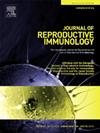PD-L1 gene variants as predictors of recurrent pregnancy loss: A case-control study among Kazakh women in Central and West Kazakhstan
IF 2.9
3区 医学
Q3 IMMUNOLOGY
引用次数: 0
Abstract
Emerging evidence implicates immune dysfunction in maintaining maternal-fetal tolerance, particularly the programmed death-ligand 1 (PD-L1) pathway. The association between PD-L1 gene variants and recurrent pregnancy loss (RPL) in women from Central and West Kazakhstan was investigated, and correlations between PD-L1 genotypes and demographic or clinical features were explored. This case-control study included 197 women with RPL and 198 controls of ethnically Kazakh women. Genotyping of rs2297136, rs2297137, rs4143815, rs822336, and rs822337 PD-L1 variants was performed by real-time PCR. Demographic and clinical characteristics did not differ significantly between RPL cases and controls from Central and West Kazakhstan. Significant associations were found in the West Kazakhstan cohort for rs822336 (p = 0.02) and rs822337 (p = 0.004). The G/C genotype of rs822336 (OR = 2.33, 95 % CI = 1.04–5.26) and rs822337 (OR = 308, 95 % CI = 1.34–7.04) was associated with an increased risk of RPL in West Kazakhstan cohort. Haplotype analysis revealed a significant association of the GTGAG haplotype with RPL in West Kazakhstan (p = 0.018) but not in Central Kazakhstan subjects. Correlation analysis showed that rs822336 was positively correlated with age and BMI (p < 0.05) in Central Kazakhstan, while rs822337 was negatively correlated with live births in West Kazakhstan (p < 0.05). The findings underscore population-specific genetic influences on RPL risk, with notable significant associations between RPL and PD-L1 SNPs and GTGAG haplotype in the West Kazakhstan cohort but not in the Central Kazakhstan cohort. This highlights the contribution of genetic factors to RPL pathogenesis in different populations.
PD-L1基因变异作为复发性妊娠丢失的预测因素:哈萨克斯坦中部和西部哈萨克妇女的病例对照研究
新出现的证据暗示免疫功能障碍在维持母胎耐受,特别是程序性死亡配体1 (PD-L1)途径。研究了哈萨克斯坦中部和西部妇女PD-L1基因变异与复发性妊娠丢失(RPL)之间的关系,并探讨了PD-L1基因型与人口学或临床特征之间的相关性。本病例对照研究包括197名RPL妇女和198名哈萨克族妇女作为对照。采用实时荧光定量PCR对rs2297136、rs2297137、rs4143815、rs822336和rs822337 PD-L1变异进行基因分型。在哈萨克斯坦中部和西部的RPL病例和对照组之间,人口统计学和临床特征没有显著差异。在西哈萨克斯坦队列中,rs822336 (p = 0.02)和rs822337 (p = 0.004)存在显著相关性。在西哈萨克斯坦队列中,rs822336 (OR = 2.33, 95 % CI = 1.04-5.26)和rs822337 (OR = 308, 95 % CI = 1.34-7.04)的G/C基因型与RPL风险增加相关。单倍型分析显示,GTGAG单倍型与哈萨克斯坦西部人群的RPL有显著相关性(p = 0.018),而在哈萨克斯坦中部人群中无显著相关性。相关性分析显示,rs822336在哈萨克斯坦中部与年龄、BMI呈正相关(p <; 0.05),而rs822337在哈萨克斯坦西部与活产率呈负相关(p <; 0.05)。研究结果强调了人群特异性遗传对RPL风险的影响,在西哈萨克斯坦队列中,RPL与PD-L1 snp和GTGAG单倍型之间存在显著的相关性,而在中哈萨克斯坦队列中则没有。这突出了遗传因素对不同人群RPL发病机制的贡献。
本文章由计算机程序翻译,如有差异,请以英文原文为准。
求助全文
约1分钟内获得全文
求助全文
来源期刊
CiteScore
6.30
自引率
5.90%
发文量
162
审稿时长
10.6 weeks
期刊介绍:
Affiliated with the European Society of Reproductive Immunology and with the International Society for Immunology of Reproduction
The aim of the Journal of Reproductive Immunology is to provide the critical forum for the dissemination of results from high quality research in all aspects of experimental, animal and clinical reproductive immunobiology.
This encompasses normal and pathological processes of:
* Male and Female Reproductive Tracts
* Gametogenesis and Embryogenesis
* Implantation and Placental Development
* Gestation and Parturition
* Mammary Gland and Lactation.

 求助内容:
求助内容: 应助结果提醒方式:
应助结果提醒方式:


